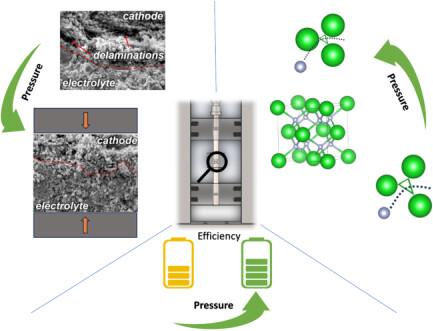Effect of Uniaxial Stack Pressure on the Performance of Nanocrystalline Electrolytes and Electrode Composites for All‐Solid‐State Fluoride‐Ion Batteries
引用次数: 0
Abstract
If all‐solid‐state fluoride‐ion batteries want to compete with existing battery technologies, significant improvements in terms of cyclic stability are necessary to fully access the high specific capacities, which this battery concept can provide in theory. Herein, the development of a high‐pressure, high‐temperature battery operation stand for battery cycling under inert conditions inside a glovebox is reported. This stand is then used to investigate the effect of stack pressure on the cell performance of conversion‐based as well as intercalation‐based electrode materials for fluoride‐ion batteries. It is found that cyclic stability as well as energy efficiency is strongly increased compared to nonpressure conditions, which is assigned to sustained interparticle contact. Thus, the cell design must be considered carefully to be able to distinguish intrinsic material properties from percolation‐ and interphase‐related impacts on the cell behavior. Further, the effect of pressure on the ionic conductivity of common solid fluoride‐ion conductors is investigated.

单轴叠加压力对全固态氟离子电池用纳米晶电解质和电极复合材料性能的影响
如果全固态氟离子电池想要与现有电池技术竞争,就必须在循环稳定性方面做出重大改进,以充分获得这种电池概念理论上可以提供的高比容量。本文报告了高压高温电池操作台的开发情况,该操作台用于在手套箱内的惰性条件下进行电池循环。然后,利用该操作台研究了堆栈压力对氟离子电池转换型和插层型电极材料的电池性能的影响。研究发现,与无压条件相比,循环稳定性和能量效率都有很大提高,这归因于粒子间的持续接触。因此,必须仔细考虑电池的设计,以便能够区分材料的固有特性与渗流和相间对电池行为的影响。此外,还研究了压力对常见固体氟离子导体离子电导率的影响。
本文章由计算机程序翻译,如有差异,请以英文原文为准。
求助全文
约1分钟内获得全文
求助全文

 求助内容:
求助内容: 应助结果提醒方式:
应助结果提醒方式:


